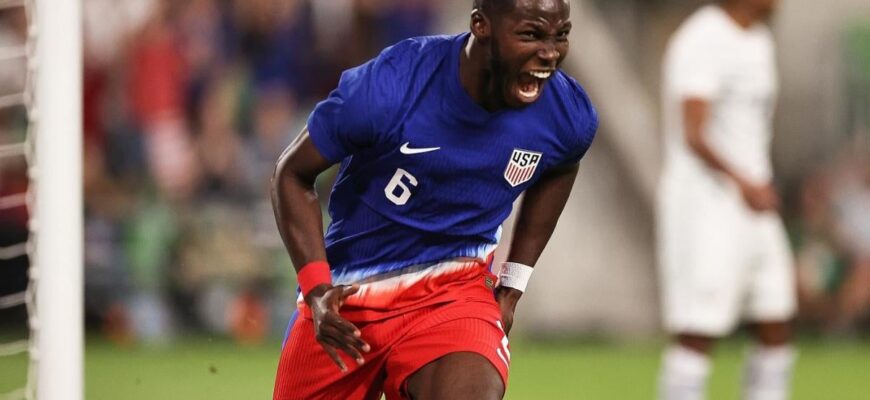INGLEWOOD, Calif. – A sense of novelty surrounded the U.S. men’s national team as they entered their Concacaf Nations League semifinal against Panama on Thursday. The CNL’s reigning champions were under the guidance of a new head coach, Mauricio Pochettino, who introduced a fresh tactical approach to address the team’s challenges, particularly the absence of key wing players. Despite these new strategies, a familiar feeling of disappointment loomed over SoFi Stadium as the match drew to a close.
Panama’s Cecilio Waterman scored the decisive goal in the 94th minute with their only shot on target, securing Panama’s place in the CNL final and preventing the USMNT from claiming their first trophy under Pochettino.
This was a match where the USMNT arguably played better but still lost. They controlled the game’s pace and significantly outshot Panama 12 to 3. Pochettino acknowledged that many aspects were positive for the team, but they failed to overcome a critical initial obstacle: competitive sharpness.
‘I think we controlled the game, yes,’ Pochettino stated. ‘We dominated the game, yes. We played in their half, yes. We developed strategies for quick ball movement and effective positioning in their half, yes. … But without aggression, it’s impossible.’
Pochettino has consistently emphasized the USMNT’s mentality throughout his early tenure, which now appears less about concealing tactical plans and more a direct commentary on the team’s current state as they prepare for the 2026 World Cup on home soil. This focus on mentality seems to be a pointed critique of the team’s readiness as they aim for success in the upcoming World Cup.
‘I think in the first half, we played too slowly, too comfortably,’ Pochettino reflected. ‘We lacked aggression with the ball, and that had consequences. … The first half was truly painful to watch.’
His players echoed this sentiment, attributing their first-half struggles to Panama’s unexpected tactical shift.
‘We needed to press harder, higher, more man-to-man, and execute our roles,’ defender Tim Ream explained. ‘I think we initially struggled to understand their pressing approach. They changed it up, and we didn’t adjust quickly enough in the first half.’
Both Pochettino and his players agreed on their improved second-half performance, where they took more shots and showed more intensity. However, Panama’s victory, despite an expected goals total of just 0.1, felt somewhat fortunate. Yet, Pochettino insisted that the single goal conceded highlighted the USMNT’s fundamental weakness.
‘Consider the situation – organization, good. Superiority, yes,’ Pochettino detailed. ‘Four-v-two in midfield, yet we concede the goal. We didn’t control the goal. We lacked aggression in duels, lost the duel, and then conceded. … If we can’t improve this, tactics and game plans are secondary.’
This defeat marks the USMNT’s third consecutive loss to Panama in official competitions and adds to a series of uninspiring performances. This trend is concerning for a team often labeled as the United States’ golden generation, who, despite being one of the youngest squads at the 2022 World Cup, have struggled to consistently reach their potential.
While some players have excelled at the club level, only a few have consistently performed at the highest club levels. As a team, they haven’t fully coalesced. Players acknowledged a lack of aggression, as Pochettino described, as a key issue in Thursday’s game. However, when questioned about the underlying cause, clear answers were elusive.
‘It’s difficult to say,’ Christian Pulisic admitted, repeating this phrase multiple times, expressing shock and uncertainty. ‘Their game plan was clear – defend deep and they did it effectively. Credit to them. I’m unsure where we lack that grit or [nastiness]. It’s hard to pinpoint when you have the ball and are trying to score. We need to be more relentless in front of goal.’
Pulisic mentioned needing to review the game footage for a clearer understanding of what went wrong. His surprise contrasted with Pochettino’s clear analysis of the issues. Despite pre-game comments from Pochettino about potentially making the USMNT world-class and his desire to ‘destroy Panama’, he wasn’t surprised by the team’s failure to rise to the occasion, even with his emphasis on mentality. Pulisic, despite his experience, seemed equally puzzled about why questions of competitive edge continue to plague the team.
Pochettino’s assessment validates U.S. Soccer’s decision to bring in a fresh perspective for the 2026 World Cup. While this loss is a setback, it may not signal the end of the USMNT’s World Cup aspirations. Pochettino himself noted that ‘there’s still time’ and that painful losses can offer valuable lessons.
For long-time observers, it’s time to question why these issues persist and whether the perceived potential of this group might be overstated.









